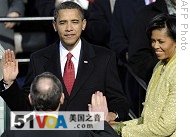Washington
27 March 2009
As President Barack Obama makes his way through his first 100 days in office, Republicans are still trying to find their voice as the loyal opposition as they adjust to a new Democratic president and Democratic control of Congress.
 |
| Barack Obama is sworn in as U.S. president by Supreme Court Chief Justice John Roberts; Michelle Obama (R) holds Lincoln Bible, 20 Jan 2009 |
After several years of calling the shots in Washington, Republicans now find themselves in the uncomfortable position of being the minority party.
Georgetown University expert Stephen Wayne says the Republicans are in for a time of soul-searching and internal debate.
"It is going to be pretty ugly," he said. "It is going to be very disjointed and it won't be until we have the next presidential election cycle that a leader will emerge to articulate this policy. So, the Republicans are in the wilderness right now and it is no fun to be in the wilderness."
For the time being, the Republicans find themselves opposing a popular new president during a time of economic crisis.
Republican Ken Duberstein served as President Ronald Reagan's chief of staff in the late 1980's, but he broke with the party last year and endorsed Barack Obama for president.
"President Obama right now is usually popular with the American people," he said. "And like Ronald Reagan, they are rooting for him, they are rooting for him to succeed because then America succeeds."
Duberstein told VOA's Press Conference USA program that Mr. Obama is proving to be an effective communicator, much like the man Duberstein once worked for, Ronald Reagan.
But Duberstein also says the president needs to get some good news on the economy soon before the public begins to lose patience.
"The problem is that you have to translate popularity into credibility, and the American people are looking for results," he said. "That will take time."
Duberstein says he first began to follow then-candidate Obama's presidential campaign early in 2007. An Obama pollster told Duberstein that the Obama campaign had closely studied the Reagan presidential campaign and his style of governing, which focused on hope and an optimistic message.
It's a style that Mr. Obama has continued as president as he repeatedly urges the country to be patient while his economic policies take effect.
"So let's look towards the future with a renewed sense of common purpose, a renewed determination and most importantly, a renewed confidence that a better day will come," said the president.
Republicans were not able to block the president's economic stimulus plan, but they do see a political opening in the congressional debate over the president's massive $3.55 trillion budget.
Younger, less well known Republicans are taking the lead on the budget debate, like Congressman Jeb Hensarling of Texas. "It is a budget that spends too much, taxes too much, borrows too much, and yet the worst is to come," he said.
George Mason University scholar Jeremy Mayer says it will take some time for the Republican Party to find a consistent message, and the leaders to deliver that message.
"If the Republicans can find a leader by this summer, can find a message by this summer, things will go much worse for Obama," he said.
Republicans have developed their own budget plan to counter the president, mindful that they were criticized for merely opposing the stimulus plan without offering a detailed alternative of their own.
Ken Duberstein says the party has some work to do to adjust to their new role as the loyal opposition.
"The Republican Party cannot just be the party of 'no'. They need to be seen as helping govern as well. I think it is incumbent on the Republican Party not to sacrifice its principles, but to meet the president halfway. That is what the American people are looking for," he said.
Republicans will be trying out messages and auditioning future party leaders in the months ahead with an eye toward the 2010 congressional elections. Historically, the party that holds the White House often loses seats in congressional mid-term elections.